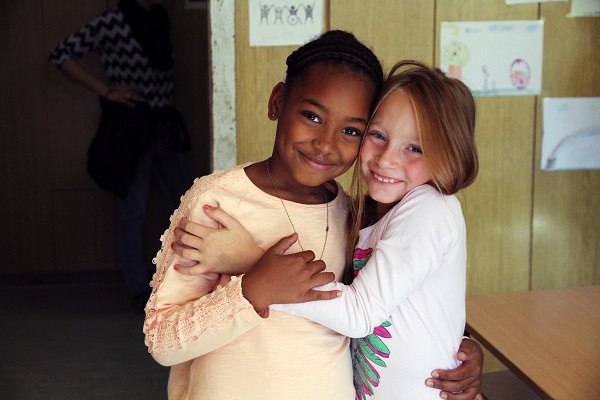 North West Balkans
North West Balkans
Languages
Children happy to go to school in Serbia
Saman* (14), Shahin* (10), Shadi* (12), Nasrin* (10) and Isabel* (9) live in an asylum centre in Bogovadja, a small settlement in central Serbia. They left their home countries with their families searching for a safe place and better future. This June, the children have completed their first school year in Serbia. Even though their favorite subjects and their ability to wake up early to go to class or do homework might differ, they have something in common – they were happy to start going to school and they didn’t give up in spite of difficulties.
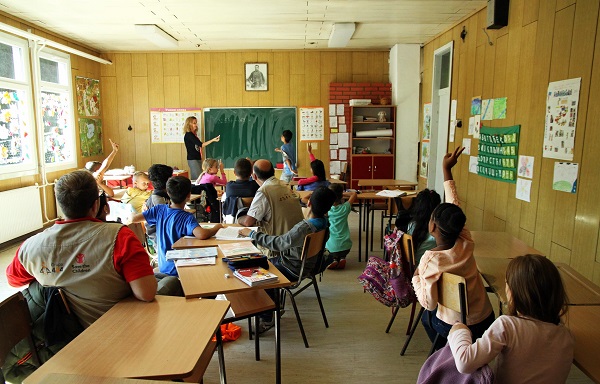
Class in elementary school "Mile Dubljevic" in Bogovadja. Photo by Nikola Vrzic, Save the Children
“I couldn’t wait to go to school”, said Nasrin* from Iran who just completed the third grade. “I was so curious to see how it was, to meet new friends. I missed learning math”, said the girl with curly hair, speaking highly of her teacher, of other staff in the school “Mile Dubljevic” in Bogovadja, praising particularly the quality of math classes.
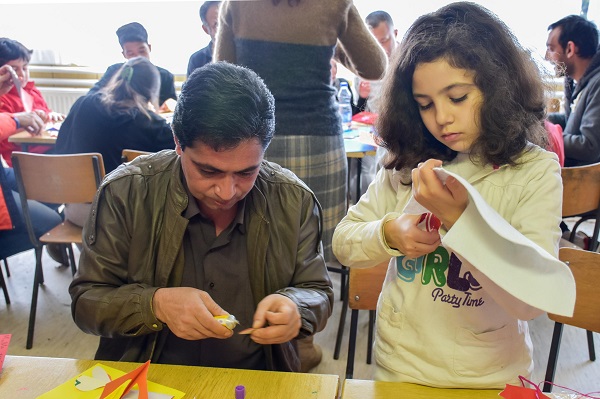
Nasrin* with her father in a workshop in school. Photo by Tatjana Ristic, Save the Children
At the end of the school year, 325 refugee and migrant children attended schools in Serbia - 240 were enrolled in 35 primary schools across the country, 65 children were enrolled into 16 high schools, and 20 children attended preschool programme.
Adapting to the new environment wasn’t always easy. Children speak about feeling out of place, anxious about being accepted by teachers and local peers. “I had a bit of a ‘stage fright’ on my first day. The teacher asked us to present ourselves, so I said – hello, my name is Saman*, I come from Iran. I didn’t want to say much because I wanted to give them an opportunity to ask me things if they were interested. They asked me and that’s how I made friends” declares Saman*, who completed the seventh grade. “Most of the teachers were good and patient with me and that helped me a lot. I think school in Serbia is good, and I miss it now the school year is over”, says the boy sincerely.
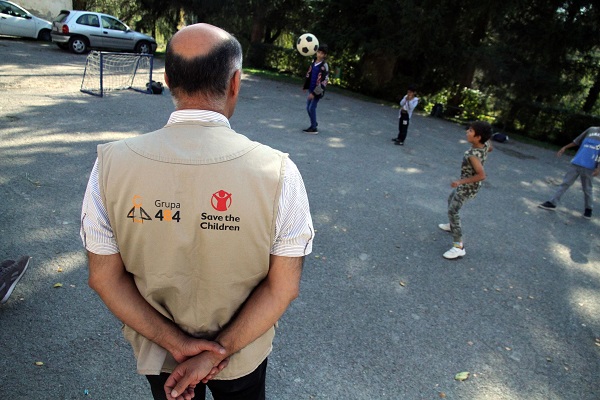
Children playing football in the school. Photo by Nikola Vrzic, Save the Children
A major challenge for children was understanding the classes in Serbian. “I was so happy to start school, since we had just arrived to Serbia from Iran and became refugees”, says Shadi*, passionately adding: “Now I feel 50% happy and satisfied with how the school was for me and 50% happy because the school is over! It was so difficult to understand classes, and also sometimes I felt like children looked at me strangely because we couldn’t really talk. We also had some fights”, says the girl sadly. Her brother Shahin* agrees that following classes in Serbian was not easy. “It gets better with time”, says young boy with a big smile, talking like a small adult, and adds: “The good thing is that we can learn Serbian not only in school, but also in the child friendly space in the centre.”
The child friendly space in the asylum centre in Bogovadja is run by Save the Children and partner organization Group 484. Since 2017, when refugee and migrant children in Serbia got an opportunity to study in Serbia and were included into official education, we have supported the enrollment of refugee children into local school. Our cultural mediators and assistants accompanied children to school, helped them with homework and offered additional classes of Serbian. They were also there for children, including to talk about their day and what took place in school. “I often ask my mother for help, but when she doesn’t know, there is a whole group of people in the child friendly space who I can ask”, says Saman*.
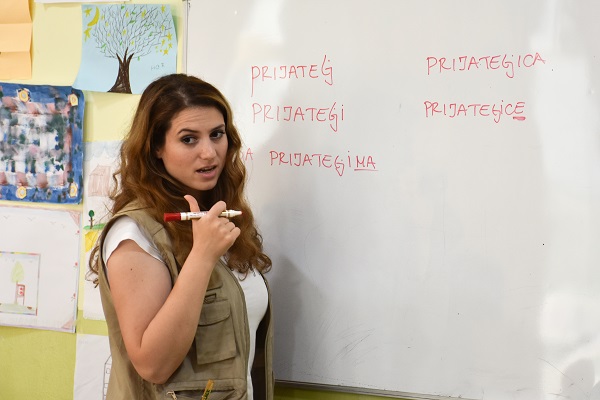
Serbian class in the child friendly space in the Asylum centre Bogovadja. Photo by Tatjana Ristic, Save the Children
The child friendly space has an important role during the summer, giving children an opportunity to constructively spend their time, play and learn. Still, the summer vacation for refugee and migrant children is much different than the summer for children who never experienced losing their homes and moving to an unknown place. Children miss the sense of structure and normality that school brings. “I am happy because I was very successful – I have the best grades. I never had any grade less than a B. I miss my school friends and all the fun we had in school, because it’s never the same here in the centre”, says Isabel* from Cuba, adding that she misses her best friend Milica* the most.
Isabel* and Milica in school. Photo by Nikola Vrzic, Save the Children
When she grows up, Nasrin* would like to be a singer, Shahin* would like to play football, Sahadi* would like to be a designer – making ordinary things to be very beautiful so the world would be a more beautiful place, Saman* would like to be an engineer – the one who invents new things that are both beautiful and help improve lives, while Isabel* dreams of being a teacher. Again, the children have something in common – they unmistakably recognize how important the education is, and, becoming mature so early, recognize the effort that they need to invest in their future.
“It doesn’t matter so much where you are”, says Saman*, “if you have basic conditions: safety, good school, family - and some of those things we didn’t have in our country, that’s why we had to leave - you can fulfil your wishes and become a respectful person with a good job.”
“Next year, I will try harder to learn Serbian”, says Shadi*, “this is the country where my family wants to stay, and, wherever you are, you can make a world to be a more beautiful place.”
